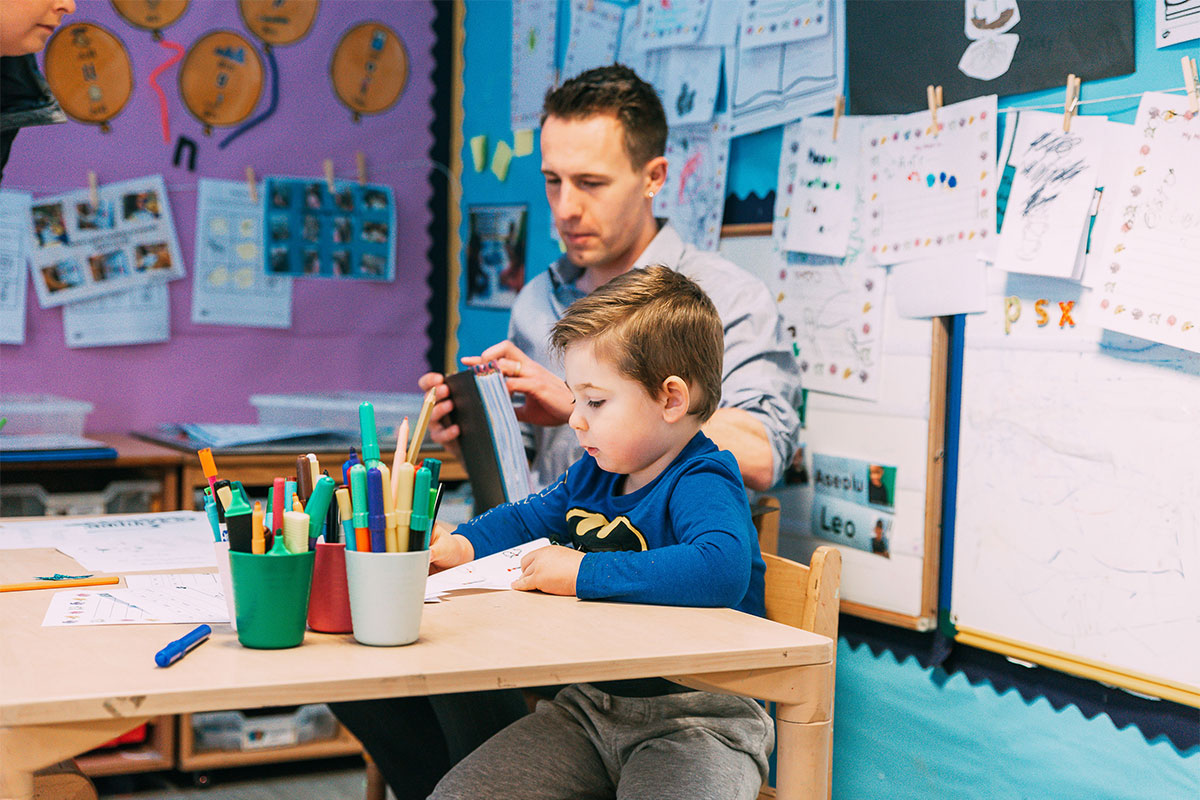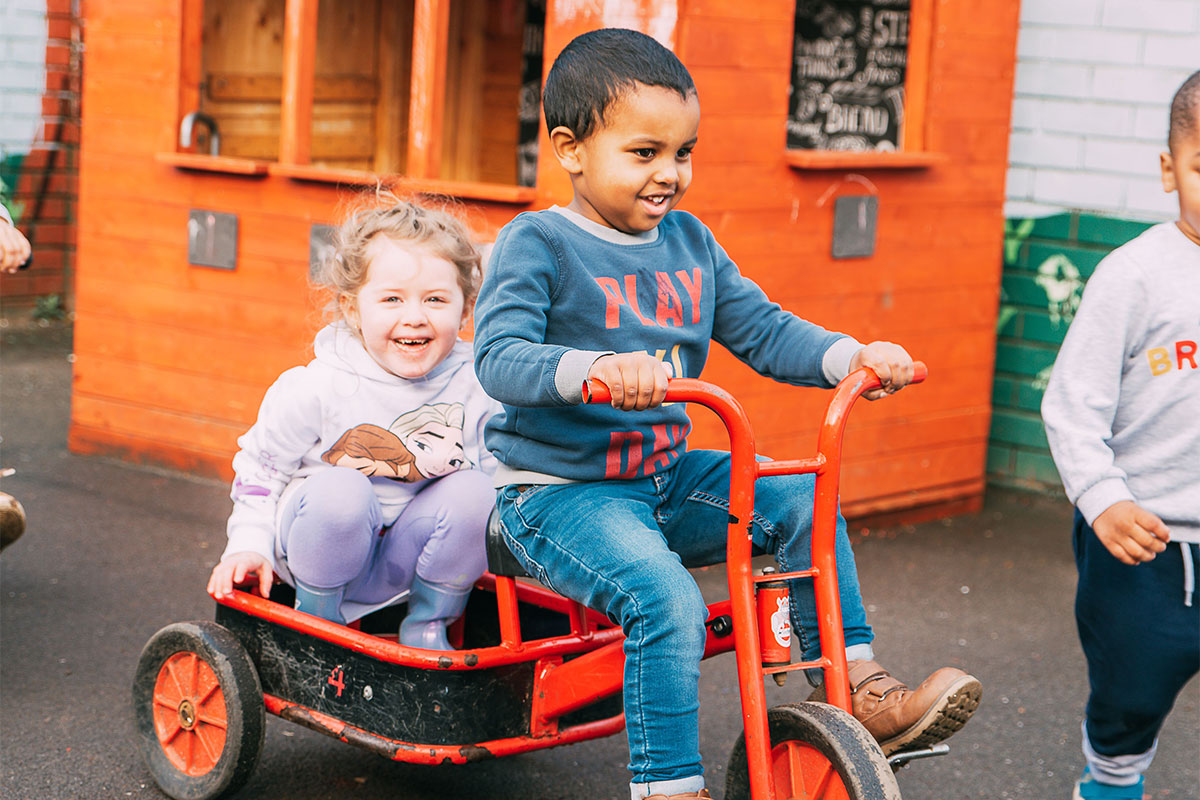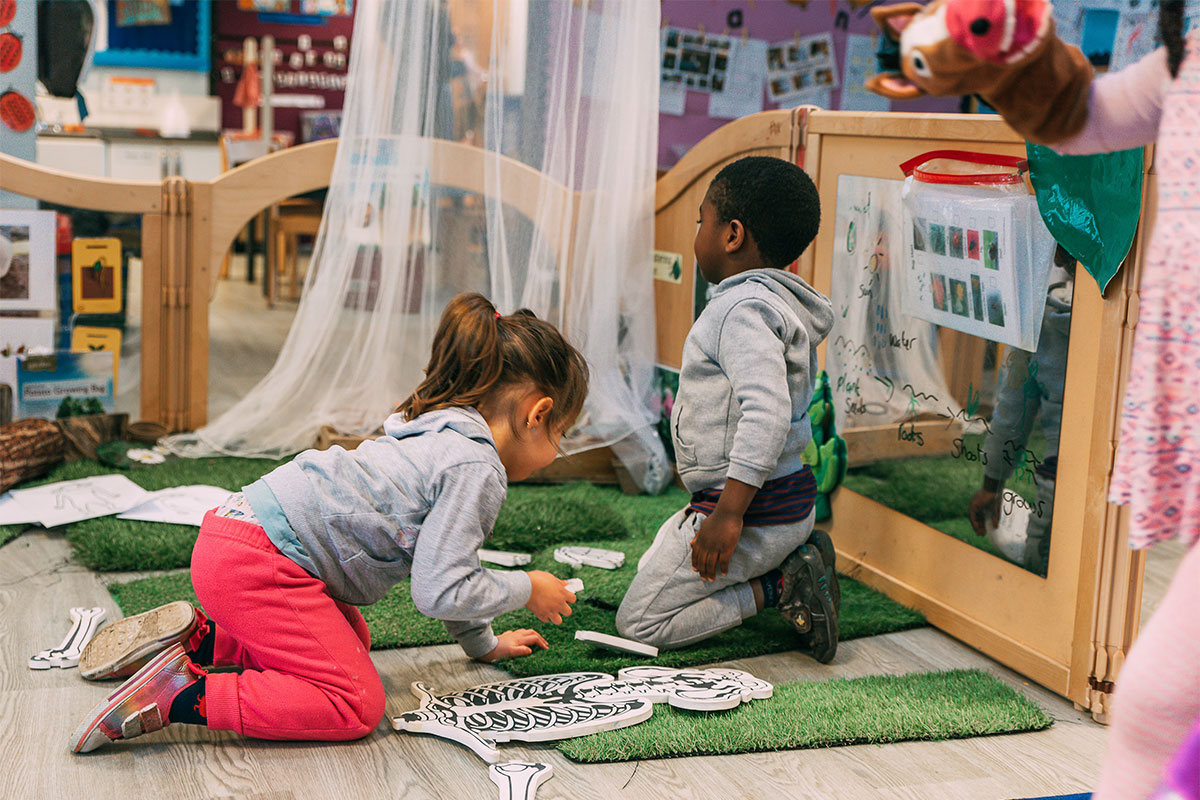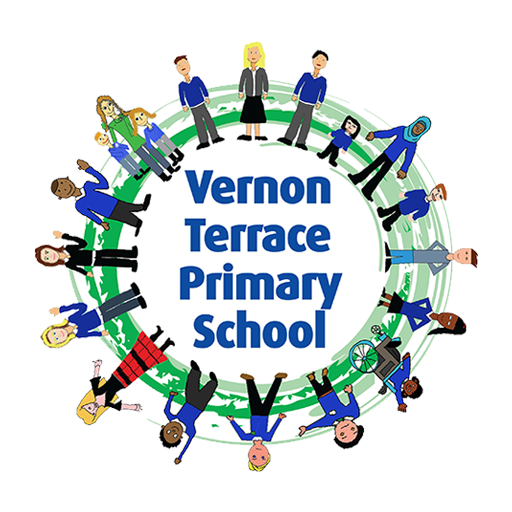EYFS
Nursery
In the Nursery, the staff use their forenames with the children. Mrs Mousley is our Head of Early Years, Miss Kasia is our Nursery teacher, while Miss Ewa, Miss Maria and Miss Jemma all work in the Nursery to support the children’s exploration, development and learning.
If you ever have any questions, please do not hesitate to ask any of the Nursery Team.
The Nursery sessions are split as follows:
- Morning session: 9am-12pm
- Afternoon session 12pm-3pm
- There are options for children to attend nursery all day (9am-3pm) with a 30 hour code, please speak to the school reception for more information.
Reception
In Reception we develop children’s curiosity and a love of learning through an exciting learning environment and resources. We respond to the interests of our children whilst delivering the seven areas of learning outlined in the Early Years framework. During the morning, we tend to learn and develop our knowledge focusing on literacy, early reading through phonics (please visit the Little Wandles website for more information), and mathematics. In the afternoons, we focus on personal, social and emotional development, knowledge and understanding of the world, physical development, communication and language, and expressive arts and design. As well as short whole class teaching sessions, a lot of our focus is in small groups.
Our provision is free flow and we make use of the outdoors as much as possible, to explore, investigate and consolidate learning. Please send your child in with a spare pair of clothes each day, along with a waterproof coat and wellington boots, so they can access the outdoor whatever the weather.
At Vernon Terrace we value a strong partnership between home and School to support your child’s learning effectively. Mrs Mousley and Mrs Souter are our Reception class teachers, Mrs Mousley is also Head of Early Years and a member of the Senior Leadership Team.
Mrs Maton and Miss Edwards also work in the Reception class, supporting the children to reach their full potential.
PE days – These are Monday and Wednesday, please send your child in wearing their PE on these days.
We provide a range of healthy snacks and cooking experiences for your children, we ask for a £1 contribution each week towards this.
If you ever have any questions, please do not hesitate to ask any of the Reception Team.
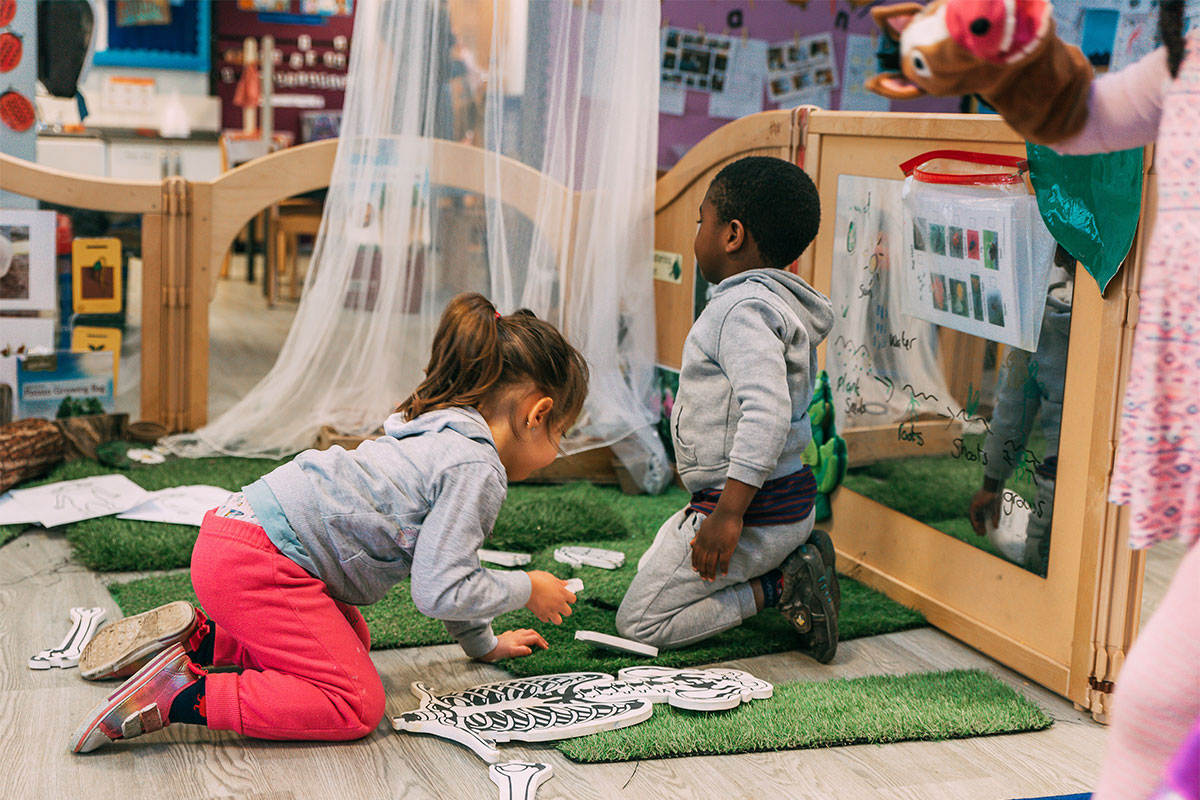
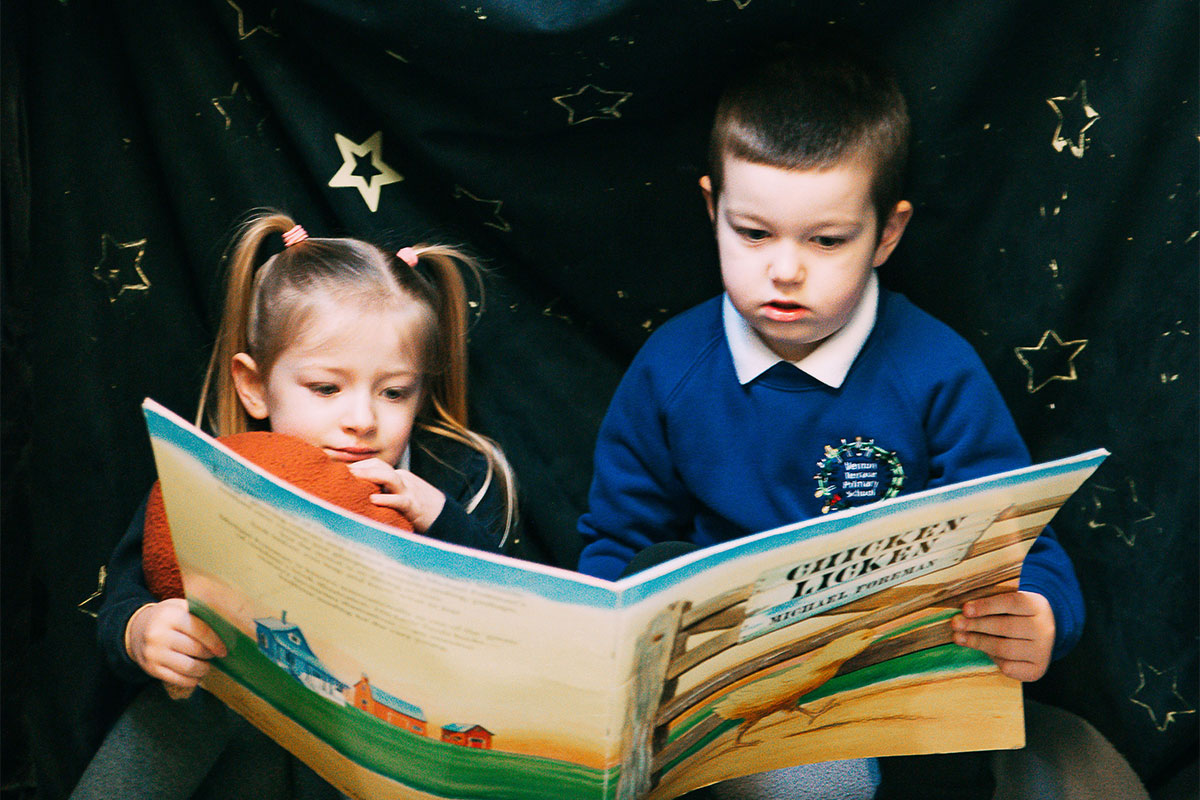
Q&As about our Early years…
What underpins your philosophy of education?
The learning environment is bright, secure, motivating and fun so that the children are encouraged to achieve their full potential. This is achieved, both indoor and outdoor, through a combination of spontaneous play and intentional teaching. We have developed a holistic approach designed to satisfy the child in a social, emotional, physical, spiritual, lingual and intellectual sense.
The children must be valued, nurtured and respected as individuals. Our role as an educator is to assume responsibility for each child’s personal and educational development whilst they are in our care. Accordingly, our planning and daily care must cater for, stimulate and challenge the diverse range of needs, talents, cultures and interests of my children. As a team of educators, we will support the children’s progress throughout their learning journey by continual observation, planning, documentation, evaluation and reflection.
The wellbeing of the children is essential, irrespective of their circumstances, such as race, religion, gender, disability or cultural backgrounds. This extends to supporting families from diverse backgrounds in their roles as caregivers. Regular communication with families is an integral aspect of my role to work alongside each other to benefit the child.
We are dedicated to building a safe, home-like yet stimulating and educational environment. Each child can then experience a sense of equality and trust within the haven of school. This environment ensures a warm, caring, supportive atmosphere where each child can succeed, grow, feel loved and secure and develop a sense of belonging. We believe this occurs when educators have a genuine interest in caring for the children. The children should respect the educators as positive role models whose actions and choices they can appreciate and follow.
We encourage the children to be proud of whom they are, achieving their fullest potential in interpersonal relationships, work and play—developing the child’s feeling of self-worth, independence, autonomy and self-discipline and leading us to be able to maintain an atmosphere that is positive, peaceful and productive.
How do you ensure an effective balance of child initiated and adult led learning?
Adult-led activities are based on our professional understanding of what we should teach young children and their experiences. Through adult-led activities, we can introduce children to new ideas, provide opportunities for them to develop their skills and ensure that they experience all areas of learning in the Early Years Foundation Stage (EYFS). This is why it is vital to balance adult-led learning with time and opportunity for children to explore their ideas, play with resources and use their imagination and creativity. It is only through doing this and practising the skills that they have learned that children will be able to take ownership of their learning and apply it in different situations in they child-initiated play. Through providing high-quality experiences for children, we should aim for a balance of adult-directed activities and child-initiated. The balance is based upon the practitioner’s judgment and the individual needs of each child, allowing them to access first-hand experiences and understand themselves and the world in which they live.
What do you consider the core knowledge and key skills which children need to be successful?
Children need to know the foundation blocks of life to enable them to have the best start in life. The knowledge is set out in the EYFS, and we follow a progression of skills for each area. These are reviewed as a team regularly to ensure that first-hand learning opportunities and continuous provision allow them to become secure in these core knowledge and skills. This reflects our vision for all of our children, and we regularly review each child through daily discussion and termly ‘monitoring checks’.
How do you ensure you teach children how to manage their feelings behaviour?
As a foundation stage, we follow ‘Think Equal’ to help support and develop pro-social behaviours and attitudes, lessening disaffection, discriminatory, harmful, and anti-social behaviour patterns, which will help support them into adolescence and beyond. We aim to empower children through various individual narratives, informing social and emotional development and creating a greater collective narrative. The individual child is encouraged to play a collaborative and contributively part in the community and the world beyond it.
Children are supported through practitioners knowing every child and what makes them ‘tick’. Through practitioners having this deep understanding, they can develop them effectively.
Example….
An EYFS setting will follow 1,2,3, magic as a consistent behaviour management approach shared with parents, which works effectively with our cohort of families.
What do you consider your children’s greatest barriers to success? How do you plan to overcome these?
Our children’s most significant barriers to success, we believe, is language, first-hand experience and access to the outdoors. Due to the low social-economic, demographic area, which the school is situated. The majority of the families are working poor and have no access to gardens, and most of the children sadly have not been to the park when they start with us. It is not about this be a restriction to them, and it is about how we can ensure we provide opportunities to ensure they have access to missed opportunities.
Our early year’s vision reflects this as we want children to be ‘happy, confident, talkative and adventurous.
These barriers are addressed throughout the year (see long term plan). Child-initiated play is vitally important in developing language, especially in the role play areas; practitioners know how to support and help lead play for these children to build a rich and deep vocabulary and language skills.
All staff are aware of the importance of developing the children’s ability to communicate and build upon the vocabulary. Achieved through storytelling, first-hand experiences, role play, talk for writing, show and tell, and staff have high expectations of the vocabulary children can acquire. EYFS staff understand the importance of language development and use the ‘key person’ system to ensure the following steps are planned and delivered effectively.
How do you use assessment to inform your work with children?
Assessment is well used to inform planning and teaching. All staff are well trained and understand the ‘Early Learning Development Strands’. We moderate amongst each other as a staff body and externally with partnership schools and the local authority.
We hold daily meetings to discuss our children, where they are, and how to progress their skills and apply them.
Practitioners have high expectations of children ensuring no ceiling is placed on their learning. Practitioners work well with parents to ensure consistency between school and home expectations. All staff are trained and able to plan from the statutory EYFS framework to reflect children’s interest, needs and development. All staff are highly effective in preparing for and managing the needs of children with SEND.
The curriculum is well designed to meet the needs of our children. The outdoor environment is an integral part of our provision. High-quality outdoor experiences are planned to ensure children reinforce all skills taught within the framework.
All staff are skilled at promoting an independent and practical approach to learning, enabling them to develop their investigative and questioning nature.
How do you teach early writing?
When working with young children, there are many stages to early writing, and each child moves through the stages at their own pace. Early writing does not refer to children that begin writing early, instead of to the beginning stages of learning to write. Every stage of writing that a child moves through is building a solid foundation for success.
Our early year’s practitioners have a firm understanding of child development and the need to ensure children master and develop the gross motor and turn their fine motor. Needed to ensure they have physical skills and control and cognitive development to start early writing. Over the years, we have developed our outside to ensure we have sizeable physical play equipment to ensure children can develop their upper strength, large block play, bricks, bikes and heavy objects, as depicted by research for children’s development.
Writing is encouraging throughout independent learning and supported where appropriate by practitioners.
Once this core set of skills has been developed, it enables children to progress rapidly through the stages of writing: Drawing – letter like formations – strings of letters – letters and spaces.
How do you ensure that there is sufficient challenge for children?
Practitioners have high expectations of child ensuring no ceiling is placed on their learning. Practitioners work well with parents to ensure consistency between school and home expectations. All practitioners are trained and able to plan from the statutory EYFS framework to reflect children’s interest, needs and development. All staff are highly effective in preparing for and managing the needs of children with SEND.
The curriculum is well designed to meet the needs of our children. The outdoor environment is an integral part of our provision. High-quality outdoor experiences are planned to ensure children reinforce all skills taught within the framework.
All practitioners are skilled at promoting an independent and practical approach to learning, enabling them to develop their investigative and questioning nature.
Practitioners know the children well through a combination of scrutinising a range of hard and soft data to enable us to make the best decisions when planning for children’s learning.
They use various tools to increase the challenge for all children, such as; Independence, resilience – Questioning and discussion – Tasks, resources and groupings – Feedback.
How do you support children who need additional help?
A fully inclusive learning environment adapted to meet the needs of each child. All staff adapt and scaffold learning to meet the needs of children. All staff work closely with the school’s SENDCo and external agencies to ensure all children receive a tailored approach to ensure all children access the framework at their level. Practitioners work tirelessly to support our children and their families to ensure they make better than expected outcomes.
